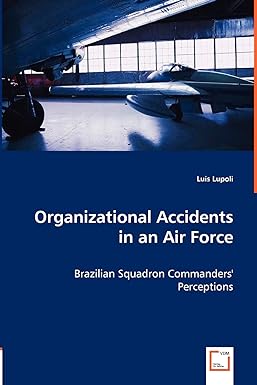Go back


Organizational Accidents In An Air Force Brazilian Squadron Commanders Perceptions(1st Edition)
Authors:
Luis Lupoli

Cover Type:Hardcover
Condition:Used
In Stock
Include with your book
Free shipping: April 16, 2024Popular items with books
Access to 3 Million+ solutions
Free ✝
Ask 10 Questions from expert
200,000+ Expert answers
✝ 7 days-trial
Total Price:
$0
List Price: $73.44
Savings: $73.44(100%)
Book details
ISBN: 3836483491, 978-3836483490
Book publisher: VDM Verlag Dr. Muller
Get your hands on the best-selling book Organizational Accidents In An Air Force Brazilian Squadron Commanders Perceptions 1st Edition for free. Feed your curiosity and let your imagination soar with the best stories coming out to you without hefty price tags. Browse SolutionInn to discover a treasure trove of fiction and non-fiction books where every page leads the reader to an undiscovered world. Start your literary adventure right away and also enjoy free shipping of these complimentary books to your door.
Organizational Accidents In An Air Force Brazilian Squadron Commanders Perceptions 1st Edition Summary: Despite the ongoing preventive actions, supervision failure remains the most serious contributor to aircraft accidents in the Brazilian Air Force (FAB). The Organizational Accidents Theory, introduced by James Reason (1997), focuses on the preexisting conditions that result from fallible decisions made by top management. Squadron Commanders are the managers who deal directly with frontline operations in the FAB, becoming the last managerial barriers to counteract flaw top-down decision-makings. The purpose of this study aims to assess squadron commanders' perceptions regarding the theory of Organizational Accidents to improve FAB's safety performance. Three research hypotheses have been formulated and answered. Surveys were sent to squadron commanders and 20 responded to them. Despite the basic understanding of aviation safety, the results show that squadron commanders need more education in advanced safety models as well as the theory of Organizational Accidents. Squadron Commanders also need a better decision-making process tailored for their managerial decisions.
Customers also bought these books
Frequently Bought Together
Top Reviews for Books
Musa khan
( 5 )
"Delivery was considerably fast, and the book I received was in a good condition."










